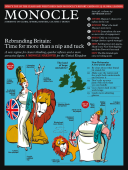
Issue 36
A new regime for clearer thinking, quicker reflexes and a more attractive figure: A Monocle makeover for the United Kingdom.
In This Issue
Oops! No content was found.
Looks like we no longer have content for the page you're on. Perhaps try a search?
Return Home

